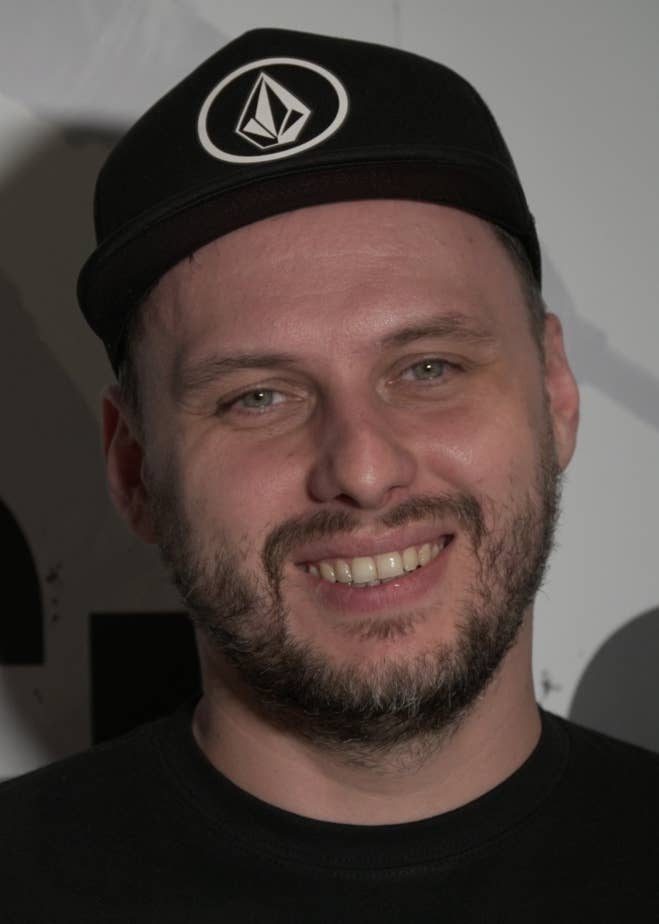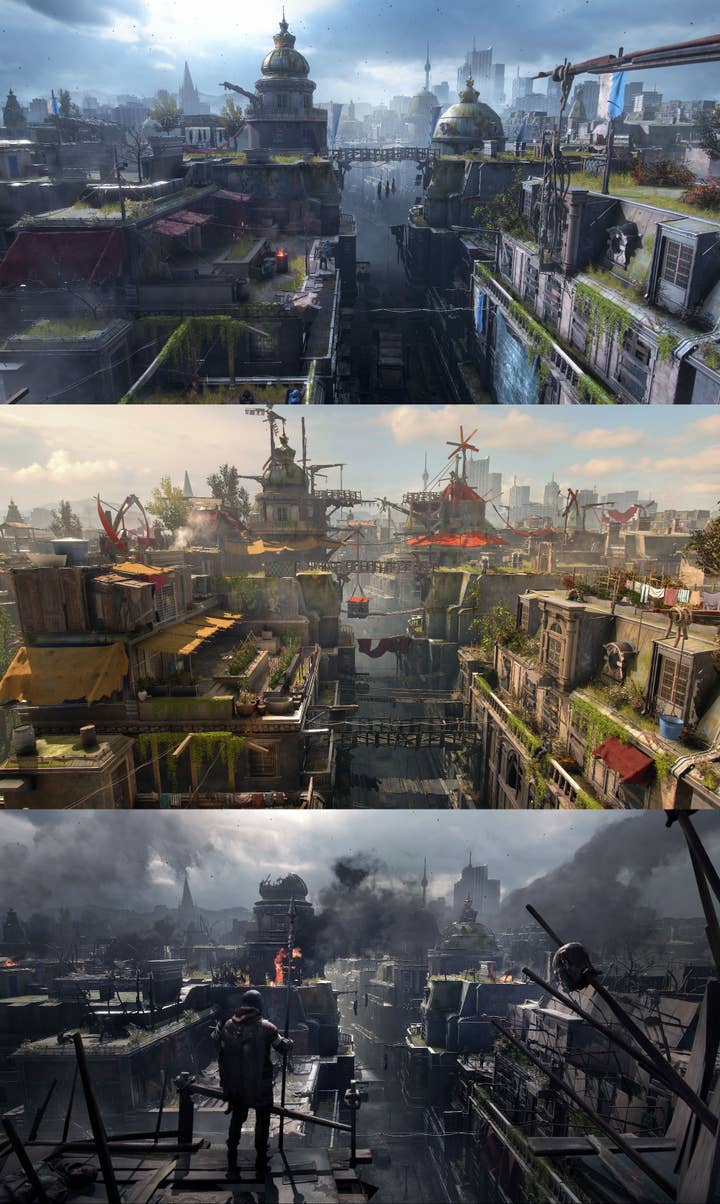Dying Light 2's choices will power “the ultimate vision for the open world”
Techland's Adrian Ciszewski details how the upcoming 'narrative sandbox' enables players to manipulate a zombie-filled city
For anyone who hasn't played the first one, it would be easy to dismiss Dying Light 2 as yet another zombie game. But developer Techland has far greater ambitions for the upcoming sequel.
In addition to the original Dying Light team, the title is also the product of venerable RPG developer Chris Avellone, who has helped take the series is a fresh direction. In the game's announcement video, Avellone described the hundreds of choices players will make throughout their zombie-slaying adventures and the visible impact these will have on Dying Light 2's open world city.
There's even a new engine under the hood, created from scratch to simulate the central city and power the 'choices and consequences' concept that will go hand-in-hand with any conversation about Dying Light 2. Behind the scenes is a "huge matrix" for the game world and all its related systems, from the factions to the zombies and even resources like clean water. While Avellone promised "hundreds of choices", our conversation with Techland chief creative officer Adrian Ciszewski suggests this might be a marketing hook simplifying the game's overarching concept.
"We're thinking about choices and consequences as a gameplay, as a narrative sandbox - not just picking a dialogue choice in a cutscene and branching the story"
"We didn't count the number of choices we can do, because it's really systemic," he tells GamesIndustry.biz. "For example, the Peacekeepers faction - they're clearing the streets of baddies, but they're also clearing the dark zones and the streets from infected. That's a system.
"If you tell the Peacekeepers about a building [full of zombies], the zombies will move from that location into another one, but that will create other problems because there will be more zombies in that other part of the city. If the Peacekeepers clear part of the dark zone, it will push the zombies to find another place to hide. It's much more like a gameplay systemic thing."
Another example Ciszewski offers is the Scavengers faction, which sets about restoring and repairing buildings. Influence events to make them move closer to the bridge, and this too will be repaired, opening up other parts of the city for the various factions. Every group has its own goals, enemies and motivations, their own problems that can be sold, their own triggers that can be used to encourage action or relocation.
In this way, it's player-driven choices that shape the world, not set moments laid out by Techland-developed quests, with Ciszewski adding: "Every time, every NPC will have a different impact and a different rule."
He continues: "It's up to you. Just know the rules and [you can] trigger things in the world to make it look different, and that will trigger different activities, different rewards."
There are, of course, larger choices to be made at the end of those main and side quests. In the example shown at E3 2018 (which you can watch above), players must decide whether to take out the men controlling the city's water supply... or team up with them and share in the profits. The former helps certain areas of the city to thrive, while the latter attracts shady merchants looking to sell items to desperate survivors.
In most choice-driven games, it's hard to escape the feeling that the developer has in mind which choice is 'good' or 'bad' (in this example, freeing up the water supply would almost certainly be good). But Ciszewski warns that Techland has been careful to ensure no choice can purely be classed as 'good' - all have both positive and negative consequences for the city. Yes, people are able to readily access running water but the Peacekeeper faction gains more power and hangs anyone that steals food or fails to fall in line.

"It's always grey, but it's always clear," says Ciszewski. "The rules are always clear. From my point of view, one might be the best choice but it might not from your point of view.
He continues: "Every time you [make a choice], there's a clear understanding of what could happen. Eventually you could be surprised because it's sandbox gameplay, and you might not realise, like, 'oh shit, I didn't know this was working like that' - but later, you just understand this new rule and you use it later on, because you won't be surprised any more. You'll know every time you do this, you trigger that, and that's a lesson you learned from your previous choice.
"You can learn more by exploring the world, talking with people, reading stuff - there are a lot of different options when it comes to learning those systems."
Learning to manipulate Dying Light 2's various factions and gameplay systems also opens up new possibilities for players to tackle situations in different ways. Ciszewski describes a castle filled with hardened foes, very difficult for a starting player to contend with. But learn their motives and trigger a particular conflict on the other side of the city and they will redeploy their troops, lowering the security at the castle and making it possible to sneak in quietly.
"The ultimate vision for the open world game needed to be improved by way of having agency on both the gameplay and story side"
"That's the shortcut you made, because you understand the rules of the world," says Ciszewski. "Otherwise you need to level up your character, do certain side quests, learn new skills and eventually kill all the guys in the castle. But that's up to you."
In this way, Dying Light 2 does not fall prey to the pitfalls of level-gating - the practice of deterring players from exploring certain areas of an open world by making it incredibly difficult to do so. Such a practice can damage a game's scope as players realise the freedom they were promised is instead a series of invisible walls guiding you down the developers' set path.
While Ciszewski acknowledges there will be certain regions with a higher difficulty, the systemic gameplay gives players the freedom to change this.
"It's not like a linear approach from level 1 to level 10 - sometimes close to a level 10 location there is a level 1 chunk, for example," he explains. "It's a randomly populated thing, and it's related to enemies.

"So in one part of the city, for example, there might be a lot of zombies - even during the day - because there are no people. But if you make people interested in this location, there won't be as many zombies so the difficulty level will drop. It's up to you, as you have the tools to manipulate these things. There's no way for us to create this linear approach because you as the player can shape it."
While sequels are inevitably bigger and bolder than their forebears, Ciszewski reveals that Dying Light 2 actually realises some of the ideas the studio had for its previous title.
"During the production of the first game, we'd been thinking the ultimate vision for the open world game needed to be improved by way of having agency on both the gameplay and story side," he says.
It was this concept that managed to secure the interest and later involvement of Avellone. Having spoken to the RPG veteran at various conferences and industry events, Techland reached out to see if he could help them achieve their ambitions. For the past two and a half year, Avellone and the team have worked closely on every aspect of Dying Light 2.
"The world we've created is post-apocalyptic and at the same time like the medieval dark ages, very similar to [Chris'] way of thinking about the post-apocalyptic thing," says Ciszewski. "He also helped with creating the lore, not just the choices and consequences. So the entire world design was done with Chris throughout."
"It's up to you. Just know the rules and [you can] trigger things in the world to make it look different"
Avellone is not the only RPG talent on the team. The studio has built a new story team from the ground up for this project, including former CD Projekt Red writer Karolina Stachyra, who penned the Blood Baron questline for that developer's seminal The Witcher 3. Ciszewski tells us the shift towards RPG-quality writing and gameplay system is no accident.
"There's a better connection between the player and the game if it's part RPG," he explains. "It makes it better to express yourself, you can do something with your character or avatar. Choices and consequences are just an example of RPG mechanics that gives you the feeling that it's your hero, your character."
He continues: "But it's still an action game. That's the crucial thing. Choices and consequences are always connected with RPGs, especially hardcore ones. But our vision for choices and consequences is different. We're creating a sandbox experience on the gameplay side - there are systems, rules, limitations, things like that. Players understand they're able to combine these things to create their own [experience], and we thought maybe it could work the same way on the story side.
"We're thinking about choices and consequences as a gameplay, as a narrative sandbox - not just picking a dialogue choice in a cutscene and branching the story."
Of course, Techland is keen to avoid alienating the audience it impressed with the original Dying Light. Ciszewski assures that "everything that's great about the first game is still here", ranging from the parkour and the melee combat to the day and night cycles that bring out different enemies.
He goes on to add that "fans will be amazed" at how Techland is evolving each of these features, but also confidently predicts that Dying Light 2 can significantly expand the series' audience.
"We think that choices and consequences, and the lore we've created for this world, it's all something that could be a surprise for people that didn't like the first game," he says. "It's more about humans and the relations between factions, so it's not just for the zombie fans."









